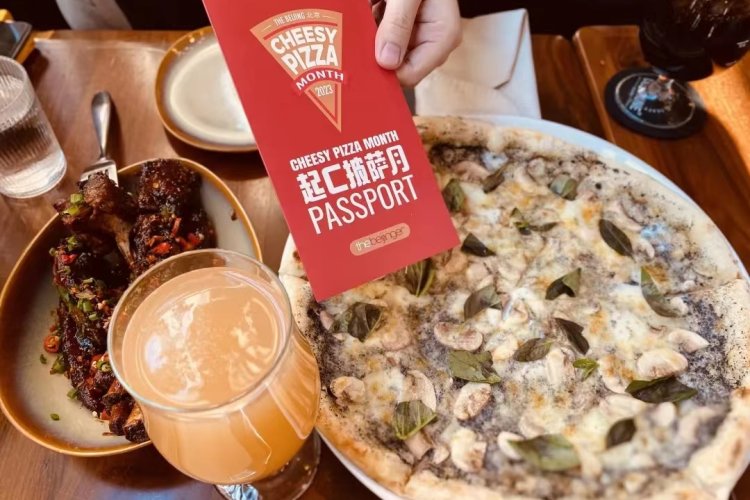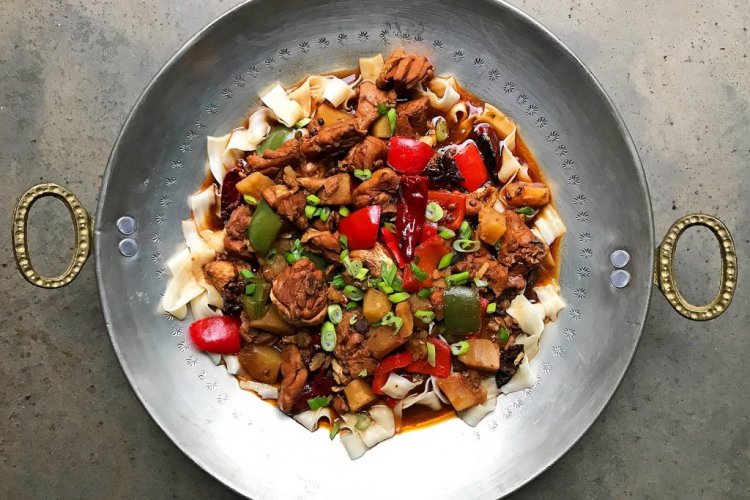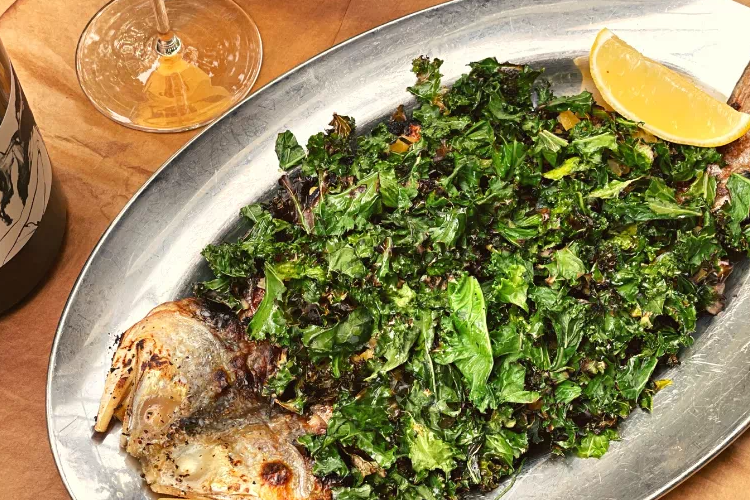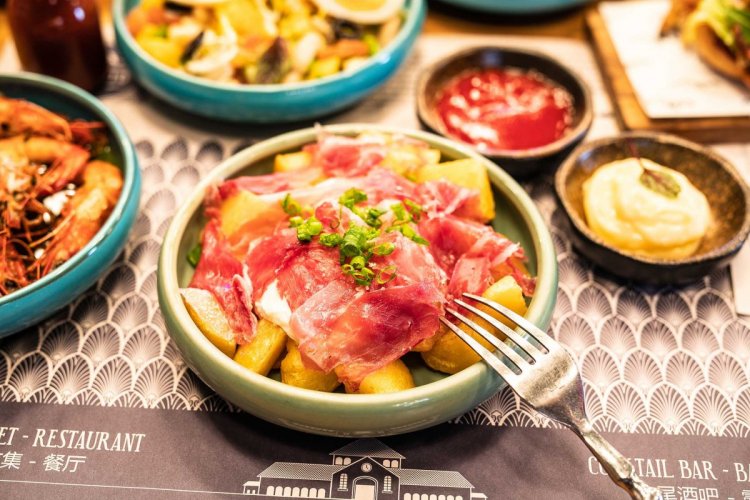Stick It to the Man: The Quest to Make Our Own Chuanr
I’ll hazard a guess that 串 (chuan), the Chinese character for “skewer,” is one of the first that most expats learn when they’re fresh off the plane. Elegant, minimalist lines sketched in not-so-elegant red rope lights offer the promise of late-night satisfaction and the threat of morning-after regret. Perhaps it’s the inevitable slowing of my metabolism, or the whispers that the meat is not quite what it seems, but I’ve found myself eating those ubiquitous lamb skewers less and less. That’s a problem I set out to fix by learning to make them myself.
DAY 1
While searching Dongjiao Market (东郊市场) for baskets for last month’s picnic feature, I chanced upon a row of vendors selling chuanr grills, which I’ve affectionately dubbed chuanr-becues. It’s the only place that I recall seeing the same kind of grills that I’ve seen on the street, though it’s likely that other wholesale markets like Jin Wu Xing (金五星) at Dazhongsi would have them too.
The first stall I passed had flimsy chuanr-becues made out of sheet metal for RMB 20-70. Visions of hot coals tumbling onto my feet danced through my head. A second stall along the zhongwai wei (中外围 51-52号) had a sturdier cast-iron version (钢板 gangban). The pricing jumped up quite a bit for the thicker grill (RMB 130-180), but I’d gladly trade a red bill to avoid accidentally burning down my neighborhood. I opted for a 50cm iron grill and a matching stand for a grand total of RMB 180, after some half-hearted bargaining. Grilling accessories like tongs and spice cans came cheap. It’s worth noting, though, that a bag of Safeway-brand charcoal briquettes (RMB 15) actually turned out to be logs of machine-processed charcoal.
I bought spices from a stall inside Dongjiao’s fish and meat market. Machine-smashed cumin (碎孜然 sui ziran) and ground chilli (辣椒 lajiao) cost RMB 3 per 50g. I also picked up skewers (RMB 3 for a bundle of about 150 sticks) and some wood charcoal (木炭 mutan, RMB 3 per jin).
I asked a nearby meat vendor (Stall 377) which cut of lamb they’d recommend for yangrou chuanr and she pointed to an ashen slab of lamb leg (羊腿 yangtui) for RMB 24 per jin. While she cut the meat into bite-sized chunks for me, I noticed a suspicious-looking black speck tumbling in the pile. At home, I mournfully flicked a dead fly off a piece of fat.
That night, I tried to light a test round of charcoal, but I got hungry and gave up.
DAY 2
Discouraged by yesterday’s failed attempts at starting a fire, I decided to take the easy route and make a batch of skewers on the stove. I added oil to a stainless steel pan and brought it to medium heat. Once the pan was hot, I laid my mini-skewers in – I had cut them down to fit inside the pan – and cooked them until the meat was done (about 5 minutes), flipping occasionally with tongs and dusting liberally with salt, cumin and red pepper.
The meat itself was gamy, but all in all, the trial run turned out better than I expected. Even so, I was unable to get over the trauma of the dead fly enough to actually enjoy the batch.
DAY 5
The grill sat untouched for a few days while I plotted where to set up my next experiment. Every spot around my apartment seemed to be under watch by some combination of security guards, rival vendors and the police. Any benefits from the thrill of grill-squatting were outweighed by the risk of getting skewered in the eye by a jealous chuanr cartel.
I finally swallowed my pride and built up the courage to ask my neighborhood chuanr lady if I could set up next to her. She gave me a funny look.
“You want to pay me money to bring your own grill, charcoal and meat and cook the skewers yourself?” she asked.
“Yes.”
“And you’ll pay me, right?”
“Yes.”
“In money?”
“Yes.”
“Okay. Mei wenti.”
DAY 6
Time to grill. After my Dongjiao meat market experience, I wanted to try for some high-end skewers, so I headed over to Boucherie Michel, the French butcher near Sanlitun. Lamb leg there costs RMB 10.8 per 100g, roughly twice as much as Chinese supermarket Jingkelong (RMB 25.3 per jin).
When I arrived with my grill, my new friends showed me how to light the coal: Take a handful of old skewers and light them on fire with the charcoal on top. I offered to plug in the hairdryer I brought, but they said a fan would produce better results.
They then debated the relative merits of underhand and overhand fan technique like a pair of retired Olympic ping-pong players. Once my fire was happily burning, we broke up the coals and spread them out across my grill. They showed me how to season the meat as it cooked: salt first, then plenty of cumin when it was nearly done, and finally pepper to taste.
The manager of the restaurant inspected our meat and disparaged my French butcher lamb as too lean. My test subjects were ecstatic about it, though, and thought it made for more of a Brazilian barbecue feel.
When I brought out kebabs of zucchini, bell pepper and eggplant, our helpers were so incredulous I imagined creating a series of “Will it chuanr?!” viral videos on Youku. Eventually they just shrugged and left us to our own fate, a fate that turned out to be both delicious and daubed in Chinese hot sauce. We went out in an expat burst of glory by roasting our own marshmallows over the grill. A few curious locals gathered around to watch us make s’mores. One chuanr guy tried roasting his own and quickly found himself in a sticky situation as strings of melty ’mallow clung to the sides of his grill.
At the end of the night, the lady asked for RMB 60 in exchange for helping me grill my stuff. I went home to brag about my newfound chuanr skills. She probably went home to tell her friends about the easy money to be made from foreigners who will pay to cook their own food.
Click here to see the Beijinger August issue in full.
Related stories :
Comments
New comments are displayed first.Comments
![]() ZedGettingCede
Submitted by Guest on Wed, 08/08/2012 - 09:06 Permalink
ZedGettingCede
Submitted by Guest on Wed, 08/08/2012 - 09:06 Permalink
Re: Stick It to the Man: The Quest to Make Our Own Chuanr
Awesome! I really hope you start a new trend of grilled veggies. Just think if one were able to buy grilled tomatoes, mushrooms, and eggplant on every corner. Beijing's streets would take two steps up in culinary class.
![]() Foukographer
Submitted by Guest on Fri, 08/03/2012 - 09:36 Permalink
Foukographer
Submitted by Guest on Fri, 08/03/2012 - 09:36 Permalink
Re: Stick It to the Man: The Quest to Make Our Own Chuanr
Great article! Both informative and funny.
Thanks for sharing that really cool experience!
Validate your mobile phone number to post comments.






